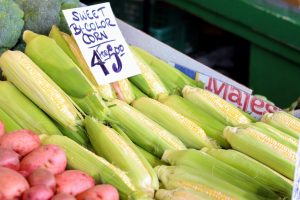Farm Bureau report: Iowa consumers worry about government-caused increases in food costs
June 19th, 2025 by Ric Hanson
(Iowa Capital Dispatch) – The Iowa Farm Bureau’s latest food and farm index found that among concerns of the high cost of groceries, the overwhelming majority of Iowa grocery shoppers surveyed are concerned about increases to food prices caused by government regulations. The Iowa Capital Dispatch says the annual survey, conducted by the Harris Poll, also found that more consumers are seeking locally grown and produced products. Latoya Guishard Welch, vice president of research for public release at the Harris Poll, said “At a time when trust in national institutions—from government to media—is at historic lows, the sustained confidence in local farmers speaks volumes about their authenticity and transparency, underscoring the strong bond and mutual respect between Iowa’s farmers and the communities they serve.”
According to the food and farm index, 80% of shoppers are concerned, and 47% are very concerned, about government regulations that increase consumer food prices. The percentage of people very concerned has more than doubled since 2021, when just 21% were more than just concerned about the role of government in increased food costs. U.S. Department of Agriculture statistics show direct imports, or finished products ready for sale, accounted for 15% of U.S. spending on food and beverages. Foreign ingredients and supplies comprised 4% of domestic food production. Forbes reported tariffs could have a significant impact on the cost of food and beverages at the grocery store, if imposed at their highest proposed levels.
A recent study from Farmers for Free Trade, a non-profit advocacy group, found that tariff costs for Iowa importers increased by $68 million, or 304% from April 2024 to April 2025. According to the study, imports from China had the highest tariffs, but imports from Mexico, Canada and South Korea faced dramatic increases in tariffs. Goods imported from Mexico to Iowa in April 2024 had tariffs of 0.2%, compared to a 4.4% tariff in April 2025. Reciprocal tariffs between the U.S. and China, which are currently on a 90-day reduction agreement, would put Iowa industries at a “significant” risk. In particular, Chinese tariffs on U.S. exports would hurt Iowa pork and soybean producers especially hard. The Farmers for Free Trade study concluded the presidential tariffs, if they took effect and stayed in place, would “have major consequences” on Iowa.

Fresh vegetables at a farmers market. (Photo by Cami Koons/Iowa Capital Dispatch)
Recent consumer price index data from U.S. Department of Agriculture shows a 23.6% increase in grocery prices from 2020 to 2024, which likely explains why price continues to be the most important factor for Iowa grocery shoppers when making decisions on which types of food to buy. Three-fourths of Iowans said meat, poultry or dairy products are part of their daily diets, and a higher proportion of Iowans say they prefer “real” meat and dairy over plant-based alternatives.
More and more, consumers are choosing to purchase these items directly from the farm. Sixty-nine percent said they have purchased groceries directly from farmers, through their online websites, farm stores or at farmers markets, and 40% of Iowa consumers look for locally made or grown labels when buying at the store. This is an increase from 2024 survey results which found around 30% of consumers sought local labels. The survey results also show that more than 90% of shoppers said they trust farmers and 49% said they place a “great deal of trust” in Iowa farmers in general. The survey also asked consumers if they felt confident farmers were caring for animals and the environment, which the vast majority, around 80% for each category, did.





